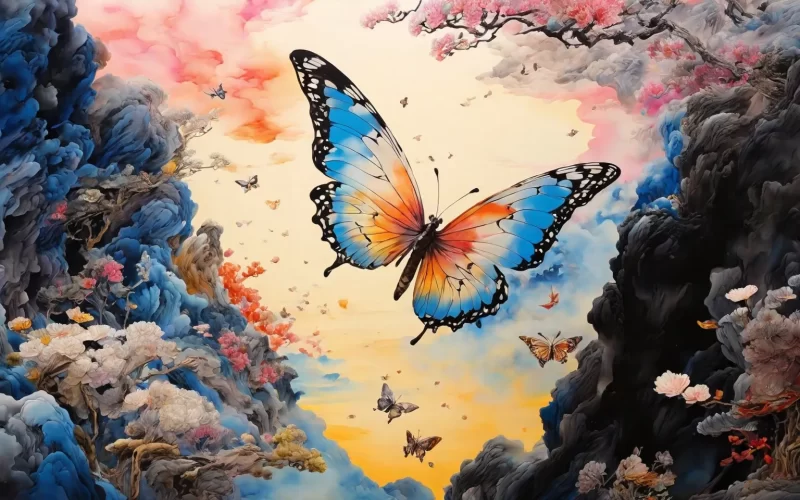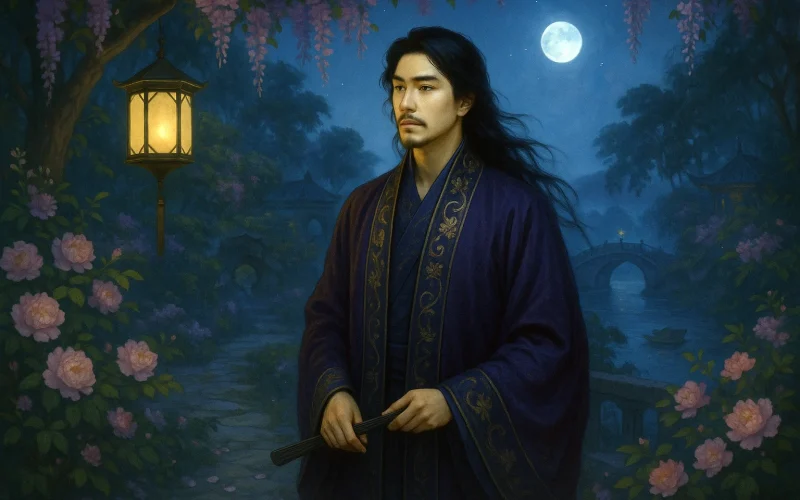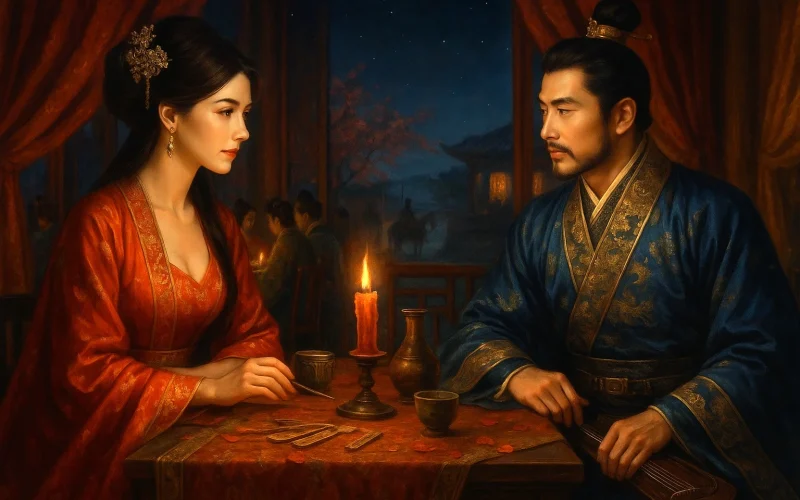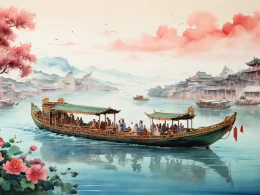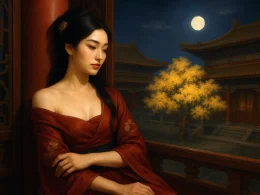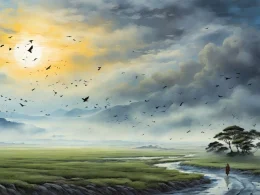I wonder why my inlaid harp has fifty strings,
Each with its flower-like fret an interval of youth.
...The sage Chuang-tzu is day-dreaming, bewitched by butterflies,
The spring-heart of Emperor Wang is crying in a cuckoo,
Mermen weep their pearly tears down a moon-green sea,
Blue fields are breathing their jade to the sun...
And a moment that ought to have lasted for ever
Has come and gone before I knew.
Original Poem
「锦瑟」
李商隐
锦瑟无端五十弦,一弦一柱思华年。
庄生晓梦迷蝴蝶,望帝春心托杜鹃。
沧海月明珠有泪,蓝田日暖玉生烟。
此情可待成追忆,只是当时已惘然。
Interpretation
This renowned poem The Inlaid Harp, a masterpiece by Li Shangyin, stands as one of the most exquisite examples of late Tang poetry. Though its exact composition date remains uncertain, the work is steeped in an ethereal melancholy, widely interpreted as an elegy to lost youth and unfulfilled love. Through the metaphor of a zither's strings, the poet orchestrates a symphony of memory, employing layered allusions to evoke vanished years, unspoken affections, and ineffable regret. Neither narrative nor explicitly confessional, the poem constructs a dreamscape of elusive symbolism, becoming a paradigm of the poet's signature "untitled" style.
First Couplet: "锦瑟无端五十弦,一弦一柱思华年。"
Jǐn sè wúduān wǔshí xián, yī xián yī zhù sī huánián.
Why should the zither boast fifty strings? Each fret and note recalls spring's vanished wings.
The poem opens with an impossible zither - its doubled strings embodying inexplicable sorrow. Every vibration becomes a Proustian trigger, transmuting music into memory. "Spring's wings" (华年) ambiguously encompasses both youthful vigor and romantic passion, establishing the work's central tension between sensory immediacy and temporal loss.
Second Couplet: "庄生晓梦迷蝴蝶,望帝春心托杜鹃。"
Zhuāngshēng xiǎomèng mí húdié, Wàngdì chūnxīn tuō dùjuān.
Zhuangzi dreamed dawn's butterfly, truth undone, King Wang's spring heart in cuckoo's grief outrun.
Twin allusions fracture reality: Zhuangzi's metaphysical doubt (whether he dreamed the butterfly or vice versa) parallels the legendary king's posthumous transformation into a weeping cuckoo. This dialectic of delusion and fidelity - one philosophical, the other romantic - creates resonant dissonance between epistemological uncertainty and emotional absolutism.
Third Couplet: "沧海月明珠有泪,蓝田日暖玉生烟。"
Cānghǎi yuè míng zhū yǒu lèi, Lántián rì nuǎn yù shēng yān.
Moonlit seas weep pearls' luminous tide, Sun-warmed Lantian's jade in mist implied.
Nature becomes sentient - pearls crystallize as tears, jade exhales spectral vapor. These synesthetic images (luminous wetness, thermal haze) materialize emotional abstractions. The geographical references (mythic pearl-producing seas, famed jade quarries) transform personal grief into archetypal beauty.
Fourth Couplet: "此情可待成追忆,只是当时已惘然。"
Cǐ qíng kě dài chéng zhuīyì, zhǐshì dāngshí yǐ wǎngrán.
This feeling waits for memory's claim, Yet even then bore sorrow's name.
The devastating conclusion reveals retrospection's paradox - present understanding cannot salvage past incomprehension. "Wǎngrán" (惘然) captures the original moment's irreducible ambiguity, a Chinese equivalent of Keats' "negative capability" where uncertainty becomes the deepest truth.
Overall Appreciation
The Ornamented Zither achieves sublime ambiguity through disciplined artistry. While often read biographically, its power derives from resisting specific interpretation. The zither becomes a Lacanian objet petit a - the unattainable object causing desire. Each couplet constructs a new symbolic system (music, philosophy, legend, geology) only to deconstruct it, mirroring memory's palimpsestic nature. This deliberate obscurity paradoxically universalizes the emotion, allowing readers to inscribe personal losses into its lyrical spaces.
Technical Mastery
- Allusive Density: Four couplets contain five major cultural references (zither lore, Zhuangzi, King Wang, pearl myths, jade lore), each resonating across Chinese literary history.
- Temporal Collapse: Present perception, past experience, and timeless myths coexist without hierarchical distinction.
- Semantic Ambiguity: Pivotal terms like "华年" (spring years) and "惘然" (inarticulate sorrow) resist singular translation, preserving poetic polysemy.
Insights
The Ornamented Zither transcends mere literary virtuosity to articulate life's fundamental paradoxes—time's erosion, love's ephemerality, and memory's deceit. The poem reveals how life's most radiant moments often lie beyond comprehension in their immediacy, their true worth dawning only in retrospect through time's alchemy. The deepest regret, it suggests, resides not in irretrievable loss, but in that primordial "unknowing" (惘然) which haunted the original experience. With supreme aesthetic grace, Li Shangyin illuminates a profound truth: emotion's most piercing resonance emerges not from clarity of expression, but from the very haze of perception itself.
Poem translator
Kiang Kanghu
About the poet
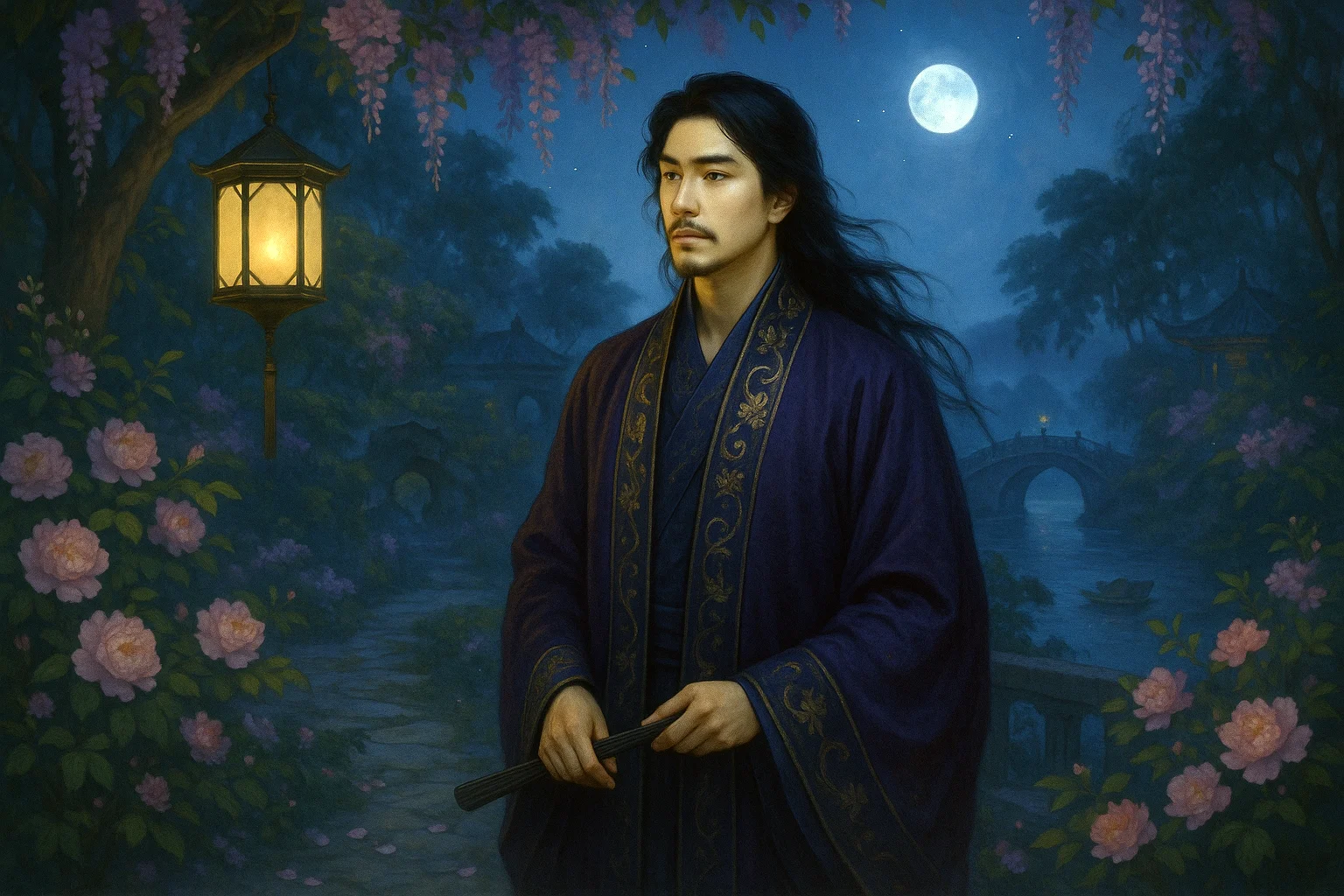
Li Shangyin (李商隐), 813 - 858 AD, was a great poet of the late Tang Dynasty. His poems were on a par with those of Du Mu, and he was known as "Little Li Du". Li Shangyin was a native of Qinyang, Jiaozuo City, Henan Province. When he was a teenager, he lost his father at the age of nine, and was called "Zheshui East and West, half a century of wandering".






